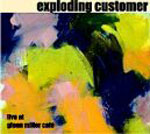Exploding Customer : Live At Glenn Miler Café (Ayler Records. AylCD-030)
Elliott Sharp : The Velocity Of Hue (Emanem 4098)
Peter Brotzmann/Frode Gjerstad : Soria Moria (FMRCD126-i0503)

They do set off in a fairly amiable manner with ostinato bass stalking behind Kutchen and trumpeter Tomas Hallensten but this soon develops into a more turbulent fracas between the two with agitated drumming from Kjell Nordesen stirring things up further. It’s strident bass man Benjamin Quigley who sets the pace for ‘Quoting Frippe (what’s the name of the bass player?)’ and keeps up a constant undertow while trumpet and sax indulge in some angular duelling as well as taking time out for individual examinations of Kuchen’s composition.
Described as ‘a requiem over a dead friend’ ‘A Broken Glass’ starts with a halting lugubrious quality, the cymbal tolling beneath the skeletal melody. It swiftly shifts up a gear and Kutchen’s sax brings a more emotive tone to the proceedings. It’s raw and wounded and despite its origins in grief and loss it is as exciting a piece of improvisation as you’re likely to find. Hallonsten introduces a more sombre atmosphere like a mourner gradually giving vent to a gradual outpouring of grief and anger. Again, a spine-tingling example of jazz that embraces freedom and focussed emotional content.
Showing that conventional forms don’t have to be anathema to free jazz, Kuchen’s ‘Tango du Prison’ pays passing homage to that particular ballroom dance though, as you may expect, they treat it with a certain degree of elasticity. Sax and trumpet become partners in a workout that is partly raucous, partly reflective.
If you aren’t sure whether or not free improvisation is for you then spend an hour or so at the Glenn Miller Café with these guys and I think you may just be convinced that it is.
I’ve no idea what a modified Godin Duel Multiac is, apart from being the guitar with which Elliott Sharp spins filigree strands of improvisation. There are recognisable echoes of delta blues in some of the playing but don’t expect to see the tumbleweeds blowing by because there is good deal more than that here. Think of Poe’s phrase ‘wild improvisations on a speaking guitar’ and you are getting nearer.
He uses sustain in a way that makes it sound like a theremin or some piece of electronic hardware, though it isn’t either. He also makes deft use of tapping at the strings and fretboard, harmonics and produces finger and string snapping runs. Oddly, at times he sounds a little like Robert Fripp, if Fripp used acoustic guitar. But most of all he has come up with something that releases the guitar from the expectations which are frequently imposed on it and refreshes its language. The nearest comparison, ignoring my Fripp reference above, is with Leo Kottke, if that’s any use.
On ‘Euwrecka’ he creates a skittering, hammered sound, percussive and densely repetitive, whereas on the title track his repetitions veer more to the melodic. His use of slide is more prominent on ‘Icontact’ which slithers and moans in an unholy union between the blues and some entirely otherworldly music. On pieces, like ‘The Face Of Another’ the strings shimmer with crystal clarity as the sustained notes hover and swoop in mournful arcs, while the final track, ‘Otolith’ resounds with gently struck harmonics. This is an album to revitalise interest in what an acoustic guitar can sound like.
It is customary to take a couple of steps back and brace yourself for the onslaught when encountering a new Brotzmann recording. The old machine-gunner is rightly renowned for pinning listeners to the walls with the ferocity of his attack. However, this pairing with fellow improviser, Gjerstad, is a little unusual.
For a start they are both featured on clarinets of various types which to some extent dictates the range of tones available and, in this case, there is a certain softness displayed. For example, on ‘Orias Oriam’ where they both use breathy, fluttering techniques to lull the listener. I say lull, because the next track, ‘Riaso Riamo’ opens with spectacular fierceness , bickering and fractious, the two horns lock and offer no let up for most of the 8.43 minutes. This is the blowtorch effect that many will be used to with Brotzmann attacking from the bass clarinet’s lower registers as Gjerstad emits a raw and savage energy by way of reply. Reverse the title and you have ‘Riamo Riaso’ and this couldn’t be more different, it’s virtually contemplative as both voices find a common ground for most of the piece, though they do decide to resume their altercations, in part, later on.
Some sort of truce seems to have been agreed for ‘Asori Amori’ and on this occasion the breath is not so much driven through the horns as gently persuaded that this is the way to go. The two giants intertwine and set up almost meditative layers of sound. ‘Moria Soria’ appears to reconcile both approaches, to an extent, since it mixes tension and release in fairly equal amounts with the calmer side of their interactions just about winning.
Most of all I think ‘Oriam Orias’ aren’t these titles getting confusing demonstrates admirably how two ferocious improvisers can explore the more restrained elements of their work without losing any of the wildness and primal energy they usually generate.
© 2004Paul Donnelly